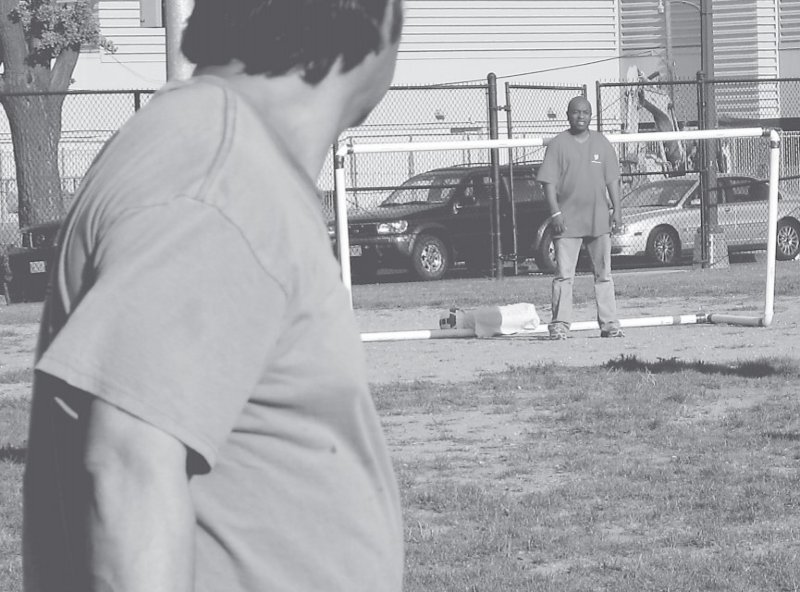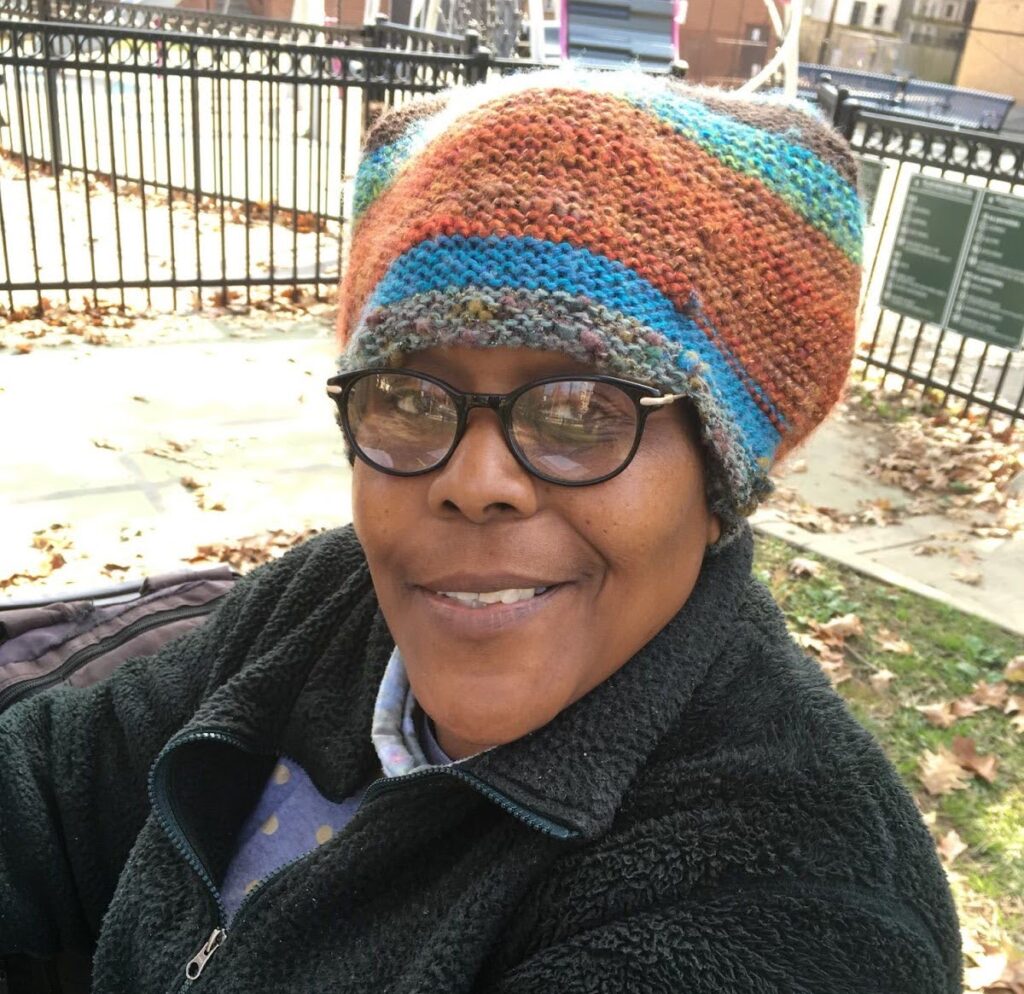They called him “soccer boy” because he was always kicking a ball around the shelter. He was in and out of jail and dealing with sickness and spiritual issues but the soccer ball was a constant.
“Soccer boy” eventually found what he called “this light shining where there’s darkness:” Street Soccer USA (SSUSA), a soccer league for the homeless. He moved away, half-way across the country, and with the help of soccer, he got rid of some bad habits and found his solace.
“Everything else didn’t matter, “ Chris Parkinson said. “I focused so much energy in soccer. I was able to get so much out through it. All that energy was being channeled through me. I was left with clarity.”
Street Soccer is a project of Help USA, a nonprofit homeless assistance organization based in New York. Lawrence Cann, who organized the soccer league said the effort quickly took on a life of its own. The first tournament was held in Charlotte in 2006. Now there are 16 teams in cities across the country, including the local team, the D.C. Knights.

And from the beginning, there has been more to SSUSA than the game itself. Participation can offer players lessons in communication, trust, confidence and motivation that have a way of taking root in their lives.
If you ask Cann, one of the major flaws of many homeless shelters and other programs is that they only target a person’s most basic needs, not the problems that may have contributed to their homelessness.
“You’ve got to be solution-oriented,” he said. “We can help them [the players] build those social skills, confidence skills,” attributes that can ultimately help men and women move out of homelessness.
“You can have all the technical skills in the world, but if you aren’t comfortable speaking to someone, you’re not going to get a job,” Cann said. “It’s kind of like establishing some reasons for being in the world: having a hobby, a community where you feel welcome, that is going to sustain you as you go out into the world and into life. You have to have passions and things you care about.”

In each city, SSUSA organizers use a three, six, and 12-month goal setting program to improve the players’ lives off the field. They claim a 75% success rate with their players making significant positive life changes; such achievements as getting a GED, addressing a substance abuse problem or mental health issue, securing full-time employment, or moving off the street.
“At face value this is just soccer,” said Jony Bell, a team manager for the Knights. “It’s when they [the players] start to get more involved in it, that’s when those doors start to open for them, whether it’s doors on the soccer field or in their life.”
For some “playing soccer is a little like a therapy,” agrees player Frank Mearns. “It relieves a lot of tension.”
Soccer As Self-Discovery
Mearns, 37, was in a drug and alcohol program last year and said the soccer team gave him exactly what he needed. “It got me outside,” he said. “We were constantly inside.”
Mearns said it was nice to have something constant to go back to every week. “It kept me going,” he said. “It gave me a reason to keep going. It gives you a reason to stay clean.”
Chino Dean has been a part of Street Soccer for two years. “It gives me a chance to get out there and be energetic,” Dean said. “It gets me away from those preventing [me] to score….at least on the soccer field it’s up to me to put the ball in the net.”
For Dean, 35, the game is a kind of oasis. “It’s the only place I can go to get away from all the hypocritical feelings in the everyday meetings and greetings with other people,” he said.

Maurice King started playing Street Soccer at the age of 57. He said playing soccer reminded him of what his high school band teacher used to tell him. “In the beginning you will feel ridiculous and you will look ridiculous and in the end you will just look ridiculous,” he said. “I wasn’t the most agile, but I didn’t let that stop me.”
The organization made its players reevaluate the paths their lives were taking, King said.
“The people that were on the team, they sort of took the task of finding more direction to their lives more seriously,” he said.
Within the homeless community King said, “There is sort of a feeling of stagnation.” Street Soccer, “for me, was an activity I looked forward to participating in,” he said. “It was something I was proud to be associated with.”
This year, the Knights team has formed a partnership with Neighbors Consejo, a service organization that works with Hispanic men with either addiction or mental health issues. Most of the team’s consistent players come from the shelter.

The players from Neighbors Consejo agreed that they are a team on and off the field. Through the enjoyment of the game and their teamwork, they are helping each other reinvision their lives.
“I feel like I’m playing for D.C. United already,” player Jorge Munoz, 43, said through a translator.
Yet the team also faces challenges.
On the field you can hear a mix of Spanish and English calls for the ball and cheers, but often there is silence. According to one of the coaches, Omar Abdul-Baki, there are often problems of communication. With any sport, players must talk with their teammates on the field or court to work as a team. But in addition to learning to cooperate with and to trust one another, the D.C. Knights Street Soccer team is also coping with a language barrier.
The Struggle To Connect
Most of the 15 players speak Spanish, while the rest of the players and most of the coaches speak English. When language fails, coaches improvise by pointing, gesturing, and resorting to their best Spanglish.
“Let’s score some goalitos,” a coach yelled out as he threw the ball in play. “Uno minuto,” he said in a heavy English accent.
Despite the hurdles, Bell, who works for the National Coalition for the Homeless said the partnership between the D.C. Knights and Neighbors Consejo has brought dedicated new players to the team. The increased structure and consistency of the team and has made it easier for the players to get to know each other and work on their personal goals.
The players and coaches alike agree the team has become much more organized over the past year. While only two players returned to practice this year, this was to the organizers’ delight. Others had left the team because they had made positive changes in their lives and were in the process of leaving homelessness behind.
“We were actually happy that our team was breaking up because it was all for good reasons,” Bell said. “It’s just been kind of amazing to see transformations in the players’ lives.”
A Vacation From Homelessness
The 2009 Street Soccer USA Cup will be held on July 31 through August 2. There are 16 teams participating from 16 different cities across the U.S. The tournament is sponsored by a number of organizations including the Leonsis Family Foundation, Washington Kastles, U.S. Soccer Foundation, Nike, D.C. United, and e7 Sports. Teams are comprised of homeless men, women and youth ages 16 and up.
From the competitors, what Mearns would call an “all-star” team is chosen for the U.S. National Street Soccer Team. This team will travel to Milan, Italy to participate in the Homeless World Cup Sept 6 through 13. The World Cup unites teams from over 48 different countries. Since 2005, a total of 32 Street Soccer USA players have traveled to World Cup contests in in Edinburgh, Cape Town, Copenhagen, and Melbourne. The best news of all is that 28 of those 32 players are now off the streets, attending school or working.
Megan Hustings a D.C. Knights team manager said that the tournament is a release for all the players from their daily worries and just a time to relax and have some fun. “I can’t imagine trying to find food and shelter and then try to have fun,” she said. “I just wouldn’t do it.”

At the tournament players get housing and food. Hustings, Development Director for National Coalition for the Homeless, said at one tournament she remembers spotting a scrap of graffiti that has remained in her mind ever since. “For three days,” someone wrote “I’m not homeless.”
Street Soccer USA Chief Operating Officer Jeremy Goldberg said the recent success of the organization has shown that the program model works. “Local partners and organizations are embracing the idea that sport is a very important tool in community and personal development,” he said. “Sport is one of the most powerful tools for social change.”
Parkinson, 28, said that sometimes the efforts to help homeless people aren’t really what they need or come from too high up. “There’s always laws or rules or regulations, things handled in courts or offices, there’s never that much handled on the streets,” Parkinson said. “The soccer program is actually on the streets helping people do something.”
To King, the concept was unique. “Especially in the world of the homeless, the idea of getting together to play together was revolutionary,” he said.
Cann said his concept is simple, “We believe in the ability and the inherent value of our participants.”
At the end of the practice, Goldberg called his players in for a huddle. They came together, close, knowing there was just a little over a month before their big game. Goldberg screamed, “less than 40 days, 40 days.” It is clear those are words all the players recognize as they yell loudly and put their hands on each others’ to make one big stack and cheer, “D.C. Knights.”







